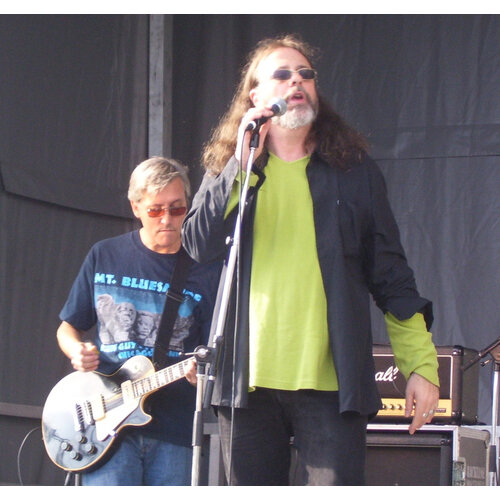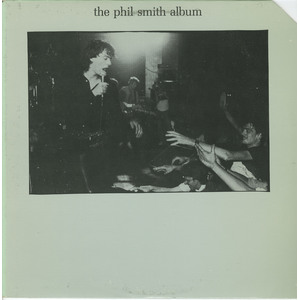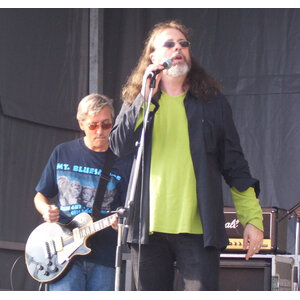Phil Smith
Websites:
https://smithcorsage.bandcamp.com/, https://johncodyonline.com/music/corsage/
Origin:
Vancouver, British Columbia, 🇨🇦
Biography:
The recent nuptials of one-time concert promoter and full-time golf and fishing enthusiast Bud Luxford and his lovely bride Sharon provided the prime opportunity for Vancouver’s punk rock class of 1977 to share a reunion, of sorts. Former members of The Pointed Sticks, The Dishrags and D.O.A. turned up looking older, wiser and, in some cases, a helluva lot healthier than they did 25 years ago.
Emceeing the event was Phil Smith, one of the city’s original punks who not only fronted his own band, Wasted Lives, in 1978, but wrote for the scene’s first fan magazine, Snot Rag, an appropriately pithy publication laid out with Scotch tape and scissors, and dutifully photostatted on whoever’s Xerox machine happened to be left foolishly unattended at the time.
Over the years, Smith has lent his croonish Lou Reed-does-Jim Morrison howl to any number of projects, including the Snow Geese, Jimbo & the Lizard Kings and, most notably, Corsage. Though initially a joke band formed in 1982 to spoof syntho-pop halfwits Visage, the multi-piece outfit eventually morphed into one of Vancouver’s most popular and compelling hard-rock acts, selling out shows at UBC’s Sub Ballroom and warming up 14,000 bandwagon jumpers at the Pacific Coliseum during The Clash’s final tour in 1984.
“By the time we played the Coliseum, it was the natural culmination of the whole thing,” says Smith, who recently released What the New World Teaches the Old, a 12-song CD featuring six new compositions and six remastered Corsage tracks previously available only on cassette. “At that point, the spectacle had started to overtake everything else, and it had run its course. But those Corsage songs have been kept alive, partially by the CBC’s David Wisdom, who plays them a lot on his radio show, and by the constant e-mails we still get about them from different places around the world. When we started thinking about this album logistically, those old songs had to be there.”
A cohesive “album” in the true sense of the term-complete with the lamentably antiquated notion of a “side one” and “side two”-What the New World Teaches the Old is a stirring work, melding dark, moody soundscapes with the warmth of traditional acoustic instrumentation and undeniably poppy song structures.
“When we started putting it together, we found that the new songs were about breaking away from the past, whereas the old songs are about being swamped by it, overwhelmed by it,” says Smith, 43. “Everyone knows that the past affects the present, but I like the idea that the present affects the past, as well. As time moves on, you look at history differently and reevaluate things.
“The old stuff was really about the death of the punk scene,” he continues, “of suddenly feeling very alone, like ‘What does a singer do after the party’s over?’ The new stuff is about taking what’s gone before and reformulating it, reintegrating it. There is always a new world out there-musically, spiritually, personally, all those things. The new songs tell one story, the old songs tell another.”
Working with longtime songwriting partner and ex-Pointed Sticks’ guitarist Bill Napier-Hemy, and backed by the unbeatable rhythm section of bassist Ron Allan (ex-Subhumans, Scramblers) and drummer John Cody (metre-master extraordinaire), the CD’s half-dozen new tracks, produced with sweeping majesty by John Maclean, range from the sombre “Magpie” to the Eastern cadences of “See You at Sakura” to the rollicking rock of the title track and the video-single, “The Comeuppance.”
The older material, recorded and produced a decade or so ago by international hitmakers Bob Rock, Dave Ogilvie and Ron “Obvious” Vermuelen, includes such college-radio staples as “Jackson,” “She’s Become a Memory” and “Victory Square.” All in all, a diverse, yet consistent and well-rounded package.
“Even by our standards, this album had a strange genesis,” says Smith, noting that the band never rehearses before entering the studio, preferring to capture the immediacy of the creative groove. “We started working on a spoken-word album, but it got really heavy. So we left it for awhile and then decided to shift gears and try something totally different. The songs always take precedence over the concept-otherwise, you get into rock-opera land.”
Regardless, there is an overall feel to the work reminiscent of such “city” albums as David Bowie’s Lodger, Iggy Pop’s Lust for Life and Reed’s New York. The more recent lyrics, in fact, were written by Smith at various stops around the globe, including London, Chicago, Los Angeles, Lyon, France, San Paulo, Brazil and Mito, Japan.
“Though we’ve played together 15 years,” says Smith, “we only tend to exist every four or five years, when all of the energies and elements combine. Sometimes it’s a phone call or a chance meeting on the street. For whatever weird reason, we go off and do our own things and then things begin to coalesce again after awhile. It really is a force beyond our control.”
-Greg Potter, Vancouver Courier, circa 2002


